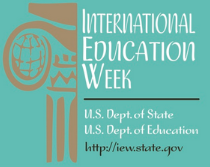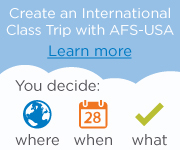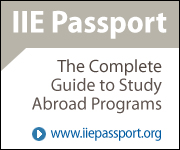
Global Opportunities for Teachers Newsletter - Celebrate International Education Week
|
 International Education Week, a joint initiative of the U.S. Department of State and U.S. Department of Education, is an opportunity to celebrate the benefits of international education and exchange worldwide. It is part of efforts to promote programs that prepare Americans for a global environment and attract future leaders from abroad to study, learn, and exchange experiences in the United States. The U.S. Department of State and U.S. Department of Education encourage the participation of all individuals and institutions interested in international education and exchange activities. To find out more about International Education Week as well as to find resources and events in your local area, visit www.iew.state.gov. International Education Week, a joint initiative of the U.S. Department of State and U.S. Department of Education, is an opportunity to celebrate the benefits of international education and exchange worldwide. It is part of efforts to promote programs that prepare Americans for a global environment and attract future leaders from abroad to study, learn, and exchange experiences in the United States. The U.S. Department of State and U.S. Department of Education encourage the participation of all individuals and institutions interested in international education and exchange activities. To find out more about International Education Week as well as to find resources and events in your local area, visit www.iew.state.gov. In order to celebrate International Education Week, the Institute of International Education (IIE) asked alumni of its teacher exchange programs what international education means to them and how they plan to celebrate International Education Week in their classrooms. Read some of their responses below.
What does international education mean to you? Being able to plan and collaborate with educators from around the globe and to share this information with the students.
- Baxter Weed, Japan-U.S. Teacher Exchange Program, Toyota International Teacher Program, 2013
International education is crossing borders between languages, cultures and people. It bridges gaps of misunderstanding and gives people the joy of discovery and awareness. Besides, international education breaks stereotypes fostering peace and friendship between diverse ethnicities.
- Alexey Bakulev, Fulbright Foreign Language Teaching Assistant Program, 2013-2014
 International education is teaching students that they are not just American citizens, but global citizens.[...] International education prepares students for the interconnected world that they are living in and will be working in. An international education helps to erase the 'us' and 'them' worldview, which is a mindset that I see with students far too often.
- Craig Divis, Fulbright Distinguished Awards in Teaching Program, 2011-2012
In my high school literature class, I consider my work a success if students leave the class with greater interest in and compassion for others. Real international education would have students of literature better understand and care for those who are far from them and often quite different from them. Yes, acquiring academic skills for college are important, but gaining interest in and understanding about the lives of others, is far more important. - Ryan Smith, Fulbright Classroom Teacher Exchange Program, 2012-2013  It allows students and teachers an authentic experience of a place that consists of different landscapes and culture. It is vital that we learn about the differences among our cultures and do so outside of a textbook. International education brings the content around the world up close and personal. - Zachary Zimmer, Hilton HHonors Teacher Treks Program, 2013
How do you plan to celebrate International Education Week in your classroom? My class has been communicating and working on an Energy Project with several Japanese Classrooms. We are currently designing plans for our next video to share about our school culture and projects surrounding energy topics.
- Jennifer Parker, Japan-U.S. Teacher Exchange Program, 2013
I plan for my classroom to skype with my brother who is working in the Andes Mountains for a few months (since we are discovering South America in our current unit). I am also going to have my students pick a global issue to look into on the computers.
- Ashley Dutton, Hilton HHonors Teacher Treks Program, 2013
 We are doing international projects, focusing on Mexico and the celebration of Día de los Muertos. We are doing international projects, focusing on Mexico and the celebration of Día de los Muertos. - Laurie Ann Eldridge, Fulbright Distinguished Awards in Teaching Program, 2012-2013 I plan to join the entire class and emphasize how English is important in their lives. - Gilberto Cavalcanti Maia, Brazil English Teachers Program, 2013
I will celebrate International Education Week in my classroom by connecting my American classes to my former students in Budapest. My classes will begin the process of exploring the global community using the internet to begin a dialogue with my Hungarian students. These dialogues will then be incorporated into classroom presentations that will explore the similarities and differences between the cultures. I will facilitate the discussions with my own experiences as an exchange teacher.
- Zack Boatman, Fulbright Classroom Teacher Exchange Program, 2012-2013
I plan to show a video where a former Fulbright Scholar shares his experience as a Fulbrighter in the USA. The video is in Spanish, so my students will benefit at the same time, from the language as it is natural and authentic. Also, as a follow-up activity, I will ask them to come up with a list of their own of advantages of studying and living abroad, and I will ask them to interview a group of international students living in my host institution so as to find out how living in the USA and studying at an American school is already enriching their lives. - Tamara Micaela Polvoreda Kaziura, Fulbright Foreign Language Teaching Assistant Program, 2013-2014 Dr. Kenneth Cushner, professor of Multicultural and International Education at Kent State University, is pleased to announce two summer courses which are devoted to internationalizing the curriculum that will be offered at Kent State University's campus in Florence, Italy. For more information on these courses, visit www.kent.edu/ehhs/ciie/studyabroad/2014-higher-education-adminstration.cfm and review the course flier. The American Foreign Service
Association is pleased to announce the 2014 National High School Essay Contest! Now entering its sixteenth year, the contest is one of the prime contests of its kind in the United States, with remarkable opportunities for young people interested in foreign affairs and the Foreign Service. In partnership with the Semester at Sea study abroad program, the 2014 winning essayist will receive a $2,500 cash prize, an all-expense-paid trip to Washington, D.C. to meet the Secretary of State, and full tuition for a Semester at Sea voyage (once the student is enrolled at an accredited university). The runner-up will win a full scholarship to participate in the International Diplomacy program of the National Student Leadership Conference. Each month we will share with you opportunities for professional development. These events are not sponsored by the Institute of International Education (IIE). How can the forces at play come together to create an environment where parents play an active and positive role in school improvement? And what obligation does the federal government have in playing a helpful role? Our guests will explore the necessary levers that schools and parents can use to drive real change.
Learn More... Please join the Alliance for Excellent Education and the K-12 Center at ETS for a webinar on options for science assessments aligned with the Next Generation Science Standards (NGSS). Register and submit questions today!
Learn More... Please join the Alliance for Excellent Education and Asia Society for a webinar on measuring twenty-first-century skills. This webinar will focus on the design of "state-of-the-art" measures of student proficiency in critical thinking, problem solving, and related twenty-first-century skills essential to succeeding in a technologically advanced, interconnected global economy. Register and submit questions today! Learn More... Join an esteemed panel of educators for a discussion on Common Core Standards and the Word Gap. Register today to attend the event at AFT Headquarters or to watch it live. Learn More... |
© 2024 Institute of International Education. All rights reserved.


